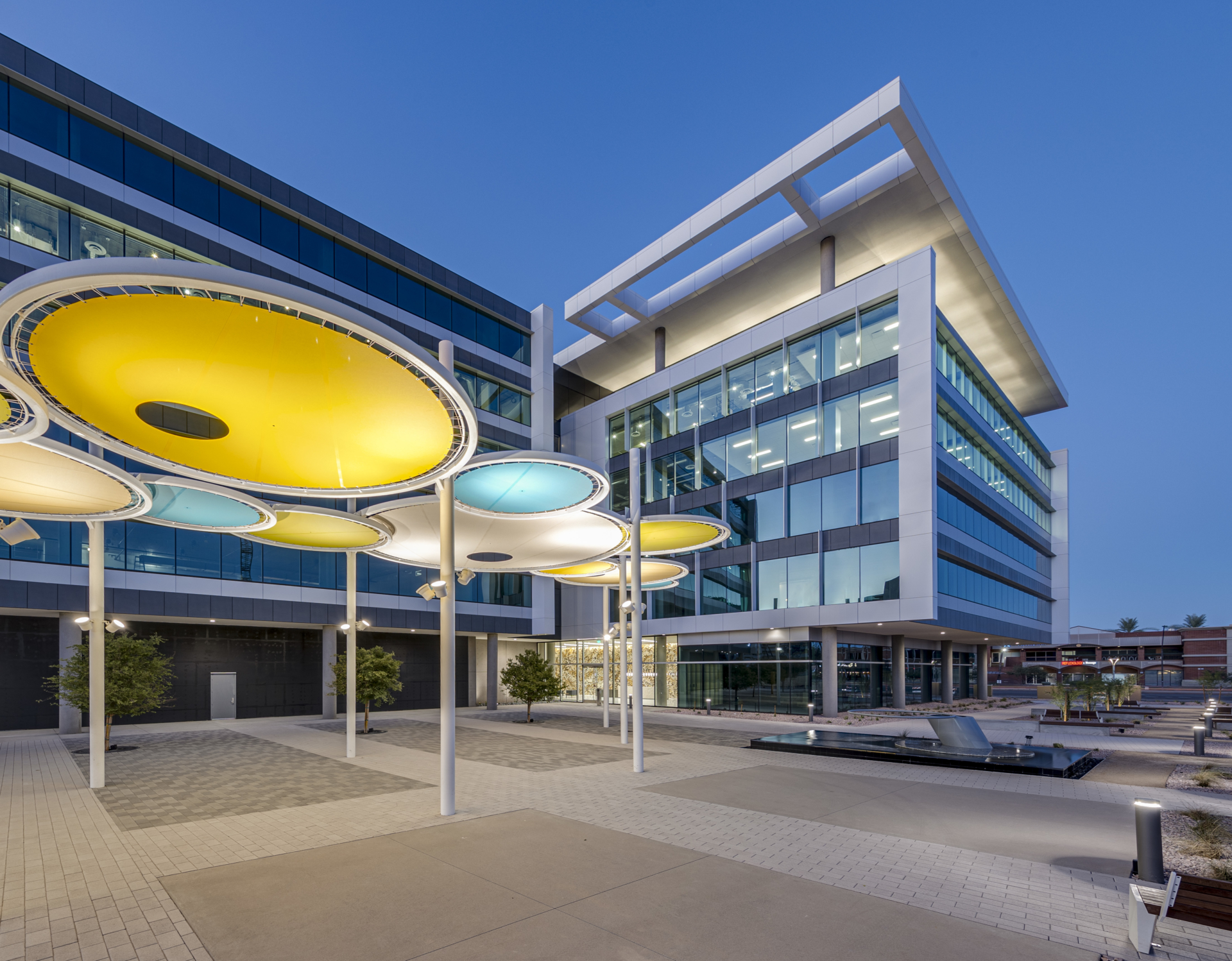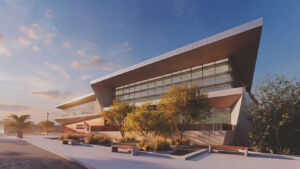ASU Sun Devil Stadium recently earned a Leadership in Energy and Environmental Design Gold certification by the U.S. Green Building Council, recognizing sustainable buildings and communities. The USGBC LEED rating system assesses the sustainability of structures based on their construction, design, maintenance and operations.
Buildings earn one of four ratings: LEED-certified, LEED Silver, LEED Gold and LEED Platinum. In 2007, Biodesign Institute Building B was Arizona’s first-ever LEED Platinum rating, the highest level awarded.
ASU now has 66 LEED-certified building projects: seven LEED Platinum, 34 LEED Gold, 24 LEED Silver and 1 LEED-certified. New ASU construction sets LEED Silver as a minimum rating, with LEED Platinum as the goal.
READ ALSO: Here are the winners of the 2021 RED Awards
“LEED buildings provide a host of environmental benefits, from energy and water savings to reduced waste and maintenance,” said Morgan R. Olsen, ASU executive vice president, treasurer and chief financial officer. “ASU’s environmental commitment ensures that Sun Devil community members will enjoy a built environment that is responsive to concerns about energy use, carbon footprint, waste reduction and other environmental concerns for years to come.”
Sustainable design principles such as LEED will help ensure that ASU continues to evolve into a unique hub for people to learn, live, work and play.
Stadium’s golden distinction
Several sustainable design considerations helped earn the 55,000-seat Sun Devil Stadium its LEED Gold certification. Fans enter the stadium via staircases that follow the contours of the adjacent butte and blend with the landscape, while strategically placed trees provide shade. Designers used native, low-water-use plants that help filter water runoff during rain. Parts of the stadium near the adjoining buttes offer scenic views and allow prevailing winds to cool the stadium.
The original concrete superstructure columns and beams support parts of the existing seating bowl. Contractors also diverted 98% of all on-site construction waste from landfills, and more than 63% of the wood used is Forest Stewardship Council-certified. Roughly 25% of the total materials used were made with recycled content, and more than 14% of the building’s materials were produced and extracted within 500 miles of the stadium.
Sun Devil Stadium now has more bicycle parking and remains easily accessible via Valley Metro buses, neighborhood circulator shuttles and light rail. These sustainable transportation efforts will enable fans to reduce game day automobile pollution.

Novus neighborhood gold
Sun Devil Stadium visitors find themselves in the heart of the Novus Innovation Corridor, a more than 10-million-square-foot development of sustainable offices, residences, retail stores and hospitality planned across 355 acres. Novus is a public-private partnership between ASU and the Catellus Development Corporation.
The Novus Innovation Corridor recently made Arizona history by earning the state’s first-ever LEED-ND Gold certification. The LEED Neighborhood Development certification recognizes larger, community-based development that comprises green homes and commercial buildings for the greater community.
“LEED certification has always been core to the development of Novus,” said John Creer, ASU vice president of real estate development. “ASU has a strong sustainability commitment; thus, we wanted the Novus design guidelines to embrace sustainable building practices that would earn LEED certification.”
The Novus Innovation Corridor is among the top 10 best-scoring LEED-ND projects ever and has also won several awards this year:
• Phase III development won “Economic Impact Project of the Year” at the Best of NAIOP Awards 2020.
• The 777 Tower, a multitenant office building, won the 2020 NAIOP “Sustainable Project of the Year” award.
• The 777 Tower also won “Best Office Project of More Than 150,000 Square Feet” from AZRE Magazine’s 2021 Real Estate Development Awards, recognizing Arizona’s top real estate projects.
The Novus Innovation Corridor and Sun Devil Stadium join other ASU projects that achieved LEED certification during 2020. A reinvented Hayden Library, a STEM high school, the Beus Center (housing ASU’s renowned law school) and Greek Leadership Village (a collaborative Greek life community) will help learners of all ages fulfill their educational goals.

Hayden reinvention scores platinum
In the heart of the Tempe campus, the Hayden Library reinvention project earned the university’s most recent LEED-Platinum certification.
The $90-million renovation lasted nearly two years. Hayden was built in 1966 and received a modern facelift with technology upgrades, and almost 50,000 square feet were added to support ASU’s busiest library. The building’s energy-efficiency features include:
• Low-flow water fixtures lessen potable water demand by 37%.
• Overall renovations have lowered the library’s annual energy costs by 47%.
• Plants and high-efficiency irrigation systems reduce potable water irrigation by 80%.
In addition to its energy-efficiency attributes and LEED Platinum status, the Hayden Library has also received awards from AZRE magazine and the American Institute of Architects:
• AIA 2021 COTE Top Ten award.
• 2021 AIA/ALA Library Building Award.
• AZRE Magazine’s 2021 Real Estate and Development “Redevelopment Project of the Year” award.
LEED across the enterprise
While the Hayden Library reinvention and Sun Devil Stadium are the most identifiable Tempe campus destinations, other university buildings scored LEED certifications for sustainable design.
The ASU Preparatory Academy STEM High School, which earned LEED Silver, includes two buildings on the ASU Polytechnic campus. It provides two wet labs, 10 classrooms and a makerspace to prepare students for college entry and graduation.
The Beus Center for Law and Society houses a top-ranked law program in a LEED Gold-certified building on the Downtown Phoenix campus. The building’s energy-efficient features include a comprehensive LED lighting system with daylighting and occupancy controls. The high-efficiency HVAC system uses chilled beams and AIRFLOOR cooling that battles the peak summer temperatures. The building’s sandstone facade and double- and triple-paned windows additionally reduce solar heat gain.
The LEED Silver Greek Leadership Village on the Tempe campus houses fraternity and sorority life with 27 connected chapter townhomes that allow individual house identity while fostering community. The village also boasts a 33,000-square-foot center with street-level retail and 450-person event space.
As ASU continues its commitment to construct more LEED-certified buildings that serve a host of occupants, it underscores the university as a sustainability leader, inspiring other institutions to follow its lead.
A variety of current and future campus visitors and students will benefit from these sustainable structures for decades to come and made possible by the insight of architects, ASU Facilities Development and Management, University Sustainability Practices, construction companies and developers.
Learn more about ASU’s past, current and future construction projects and follow Facilities Development and Management on Twitter at @ASUfacilities.




